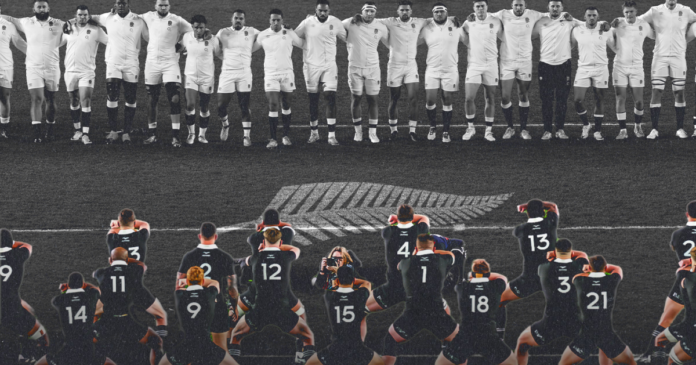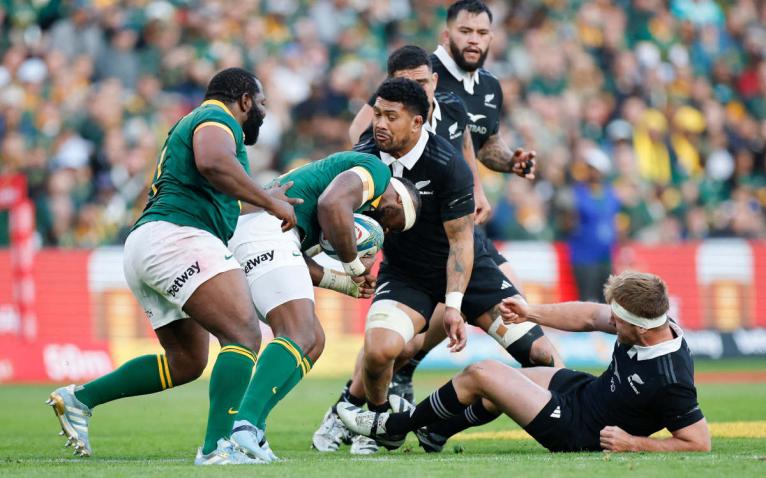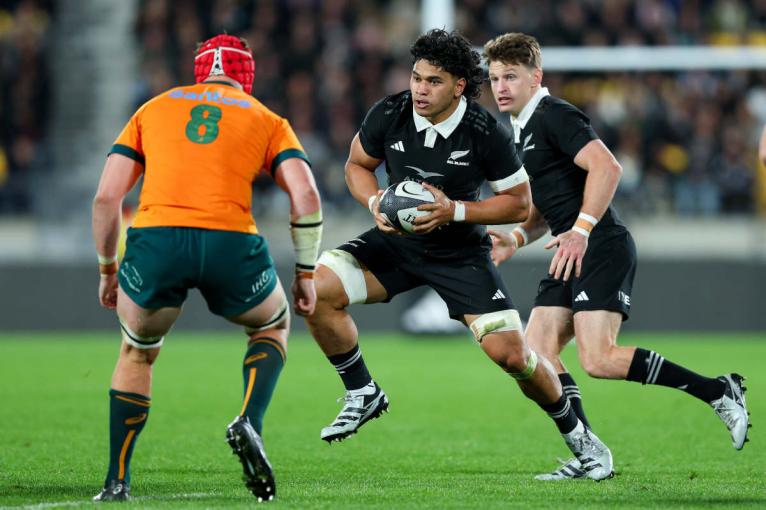
[ad_1]
The All Blacks have arrived in London with a definitive sense that they are going to be tested in ways they have not yet been tested this year.
Which may seem odd given they start their tour with a Test against England who they have already played twice this year.
But the England team the All Blacks played in July, despite not having played since then, will present an entirely different proposition in London to the one they did in Dunedin and Auckland.
It’s just the way the international rugby is – that it’s incredibly tough for the North to perform well in the South in July and likewise, that much harder for the South to do it when they travel North.
The All Blacks know that they met a team on its last legs in July, with many of England’s players having been on the go for 12 months solid due to the World Cup.
They met a team that was trying to dig out two big performances in the depths of the New Zealand winter when maybe, all they wanted to do was be back home in the English summer.
And yet more specifically the All Blacks know there is the Twickenham factor to consider – that England on their home patch have this rare capacity to enjoy these incredible momentum surges that can change the game in minutes.
New Zealand have had too much first-hand experience of the Twickenham surge factor to dismiss it as myth. They felt it in 2012 when England went on a 10-minute rampage in the second half, threatening to win by a lot more than the 38-21 final score.
The All Blacks narrowly won two Tests in June but after a further seven Tests under Scott Robertson, have they improved? (Photo Hannah Peters/Getty Images)
Then there was the last time they played England at Twickenham. That was yet more incredible as England were 25-6 down with nine minutes remaining and seemingly no show whatsoever of mounting any kind of comeback.
But out of nowhere they clicked into gear and became unstoppable. The unthinkable became the thinkable when three tries were scored in nine minutes and if England had been afforded just one more minute, they would have got the job done and won and instead of drawn.
Just how deadly England can be on their home patch is something All Blacks vice-captain Ardie Savea felt the need to acknowledge shortly after arriving in London.
“I think England not only bring the physical game, but they have got a bit of razzle and swag to their game as well and with Marcus Smith at 10 they can play from anywhere,” said Savea.
“We saw that the last time we played them at Twickenham. We got up and they came back and drew for us, we have just got to be clinical, nail our job, our role, every moment or try to.
“We have grown a lot since the two tests in New Zealand. It is just a matter of coming together on Saturday and nailing it under pressure. “We understand how important the crowd is and the noise that comes with it.
“There will be times when England get up and have the momentum and we have to get back in the moment.
“We have to expect that and when it does come breathe and try to nail our next moment.”
Savea’s references to staying in the momentum and remembering to breathe are likely to have been key messages that the All Blacks senior players and coaching staff have been banging into the squad since they arrived in the UK.
And they will have been doing this because the All Blacks have been plagued by one key failing all season – which has been their inability to hold their structure, attacking shape and discipline through the full 80 minutes.
Teamwork on point 🎯#SAPPlaybyNumbers gives you stat-focussed insights into some of the most memorable plays from the 2024 season 🤩#AllBlacks pic.twitter.com/S4gJ4Tild9
— All Blacks (@AllBlacks) October 30, 2024
There was an incredible statistic five games into the Rugby Championship that the All Blacks hadn’t scored a single point in the final quarter. Combine that with the three losses they suffered and it’s not easy to know what to make of the All Blacks.
They have improved since they beat England in July, but the difficultly is knowing by how much. They have lost three tests, but at the same time, they gave themselves a golden opportunity to win all three – the two defeats in South Africa being particularly painful as the All Blacks had the Boks in big trouble but couldn’t finish them off.
But only once this year have they produced a second half surge where they have turned the screws and squeezed an opponent into submission.
That was against Australia in Wellington in September – a performance that easily ranks as their best of 2024 for the simple reason they didn’t drift out the game in the final quarter.
So on the face of it, it’s not apparent how much, if at all, the All Blacks have improved since they beat England in July. The main failing they had in July of not being able to hold their structure and discipline, has largely stuck with them and the question is how much weighting to place on that performance in Wellington?
Was that the moment the All Blacks came of age? Was that the sign that they are now finding a level of confidence with their game and an ability to implement it more effectively?
Savea thinks so, or at least he says he’s confident the team has grown significantly since July. “It has been a journey of growth,” he said. “Connecting and coming together as a team and as a family.
 All Blacks captain Ardie Savea says the side has been ‘growing’, but there’s no doubt they’ve been usurped by rivals, South Africa (Photo PHILL MAGAKOE/Getty Images)
All Blacks captain Ardie Savea says the side has been ‘growing’, but there’s no doubt they’ve been usurped by rivals, South Africa (Photo PHILL MAGAKOE/Getty Images)
“There is a lot of new personnel coming together and I feel we are starting to understand what our game is. We are starting to understand the players around us and hopefully we can connect this week.
“You are always evolving if you think you can stay the same from the start of the year to now you are kidding yourself. As a team we are always evolving.
“Those first two games of the year we were not just trying to tick a box we were trying to win. That’s the great thing about time you get to bond and connect and understand your gameplan.”
What sways the thinking more towards Savea being right, and that the All Blacks are a better, more cohesive team now than they were back in July, is the volume of personnel that has changed.
Since July, Tupou Vai’i has become a world class lock. He’s found himself at this level – becoming a more dominant lineout force and more impactful ball carrier.
In July, Partick Tuipulotu wasn’t match fit so the All Blacks lacked the locking punch they do now. Sam Cane wasn’t available in July because of injury and Wallace Sititi has emerged as a thunderous loose forward with explosive power on both sides of the ball.
Cam Roigard has returned from injury to give the All Blacks variety at halfback and Caleb Clarke has made himself the first choice wing, because he has tightened his defence and added accurate aerial ability to his repertoire.
And maybe the two biggest changes of all – Will Jordan is back from injury and as sharp as ever and Beauden Barrett has been shifted to No 10 where his maturity and experience have given the team greater composure and tactical control.
With these players having developed, some having returned and others having been shifted to their rightful positions, the All Blacks do present as a different – better – team to the one that only just managed to scrape past England.
“They have either had someone senior that has taken them under their wing and they are now stepping into a position where they are having to lead and to step forward and be that guy and they are showing it,” Savea said of the generation of emerging players such as Vai’I, Clarke, and Sititi, the latter who he has personally mentored.
 There are high hopes Wallace Sititi could be another All Black superstar In the back row (Photo Hagen Hopkins/Getty Images)
There are high hopes Wallace Sititi could be another All Black superstar In the back row (Photo Hagen Hopkins/Getty Images)
“ We are close. He’s been amazing coming into this environment, he has found what works for him and he’s playing great footy and that is testament to him, his preparations, his level headedness and the calmness he has. He’s inspiring and that is special.
“With the way he is playing he can play six, seven or eight he is quality and I think Wally and I have the same mindset we are just grateful wherever we are playing and grateful to be starting.
“He can play 8 and be awesome. Six and be awesome even seven. He is only 21 and it is something he has got and that is something you want to flourish and for him to keep playing the way he is playing.”
[ad_2]
Copyright for syndicated content belongs to the linked Source link

